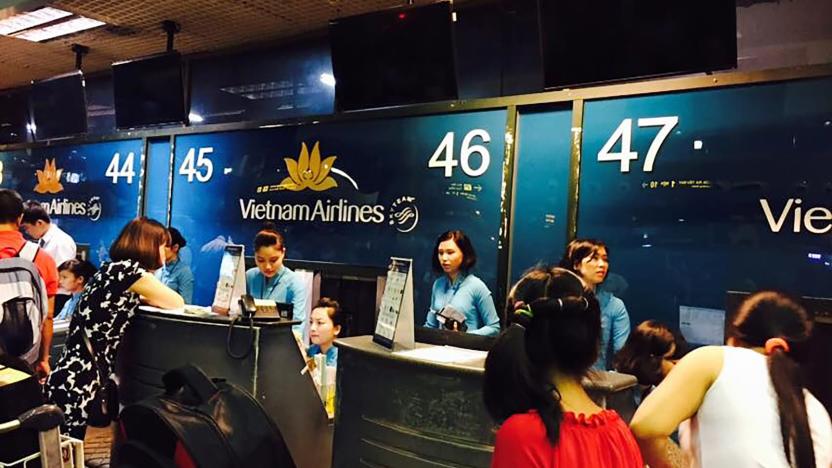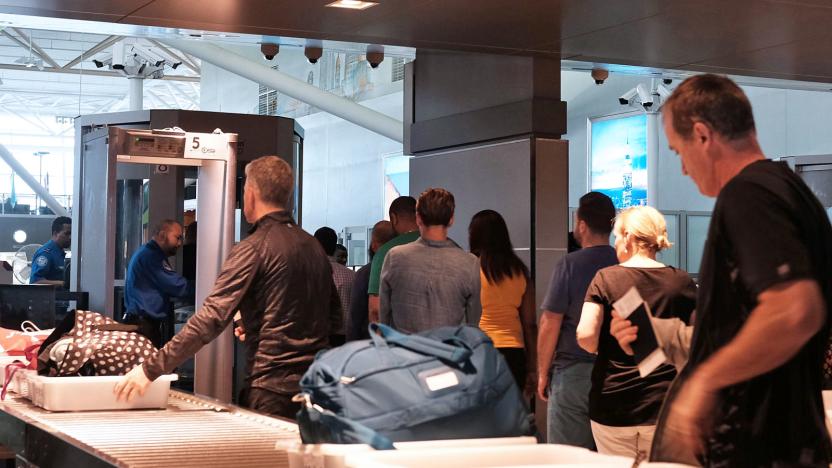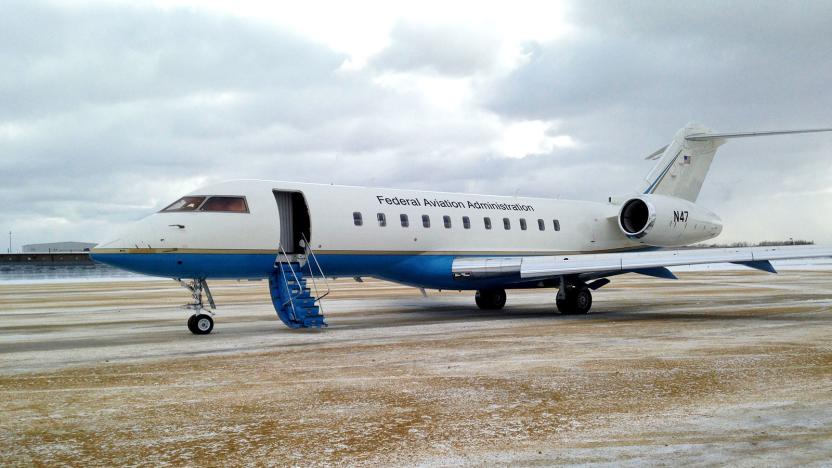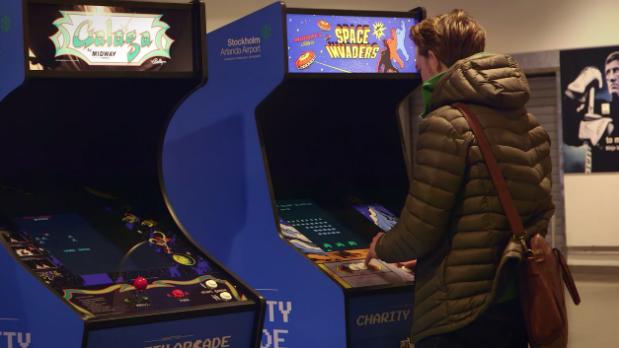airport
Latest

Hackers target Vietnam airport screens with political messages
China, the Philippines and Vietnam are embroiled in a bitter dispute over territory claims in the South China Sea (a court has ruled that China's claims are illegal), and that appears to have led to some audacious cyberattacks on July 29th. Vietnam's state media claims that hackers compromised both the website of Vietnam Airlines and the flight info screens at both the Hanoi and Ho Chi Minh City international airports. Reportedly, passengers saw messages slamming the Philippines and Vietnam over their South China Sea positions -- it won't surprise you to hear that the government is blaming a Chinese hacker group (1937CN) for the incident.

American Airlines to test automatic security screening this fall
It's bad enough that US airports engage in security theater that seldom makes you safer. However, it's made that much worse by the delays -- having to wait for agents to X-ray your bags is frustrating when you're desperate to get to your gate. American Airlines and the Transportation Security Administration aren't deaf to your complaints, though. They're partnering on a trial this fall for automatic screening technology that should be both more effective and save about 30 percent of your precious time in line. Among the improvements are automatic conveyor belts, a way of isolating risky bags without disrupting the queue, RIFD tags for bins and cameras that link outside photos of a bag to its X-ray.

The FAA just tested an FBI drone-finding system at JFK
Airports are getting more worried about civilian drones wandering into commercial airspace. While the object that struck a plane landing at Heathrow last month was almost certainly not a drone, security experts fear that unmanned aircraft loitering near airports could get sucked into an engine and bring down a whole plane. After multiple near-misses at JFK in the last two years, the FAA borrowed an FBI drone detection system and field-tested it at the international airport last week.

Taxiing airplanes could soon get flight info wirelessly
Airlines have made great efforts to update their tech, including replacing bulky flight manuals with iPads. But pilot teams still receive flight information updates the same way they've been doing for decades: over radio voice comms, as current wireless solutions don't support high-enough volume data transfer. Last February, a joint NASA and FAA team sent flight updates to a taxiing airplane over a wireless communication network for the first time, NASA said Tuesday.

'Drone' hits British Airways plane at Heathrow Airport
The Metropolitan Police has confirmed it is investigating an incident at Heathrow Airport after British Airways plane was hit by what is believed to be a drone. BBC News reports that the pilot of aircraft BA727, which was approaching Heathrow after flying from Geneva with 132 passengers on board, contacted police shortly after the collision at 12:50PM. The Met has yet to confirm specifics, but if it is proven to have been a UAV (Unmanned Aerial Vehicle), it will likely be the first recorded incident where a drone has struck a plane.

American Airlines teams up with Uber for door to door travel
American Airlines has jumped into bed with Uber in order to create a service that's as "door to door" as the pair can make. The idea is that fliers who can afford not to take the airport shuttle will get a "seamless travel experience." For instance, if you're flying with AA, you can set a reminder for an Uber pickup the moment you buy your ticket. Then, when you land, the app will guide you through the terminal and point you to your nearest Uber pickup location. That is, assuming that you're landing at one of 11 locations in the US that AA has added maps to its app, which include Chicago O'Hare, Dallas Fort Worth or LAX. So, uh, good work on that one.

UberX can pick you up from Los Angeles International Airport
Lyft may have beaten Uber to the punch on offering ridesharing pickups from Los Angeles International Airport, but its lead will be short lived. As of January 21st at 8AM local time, you can order an UberX car to pick you up at LAX, not just drop you off. Previously, you had to spring for a pricier Uber tier (or go to the competition) to get a ride at the end of that long business trip. Do be prepared to hoof it and possibly endure a wait, though.

Ukraine blames Russians for a cyberattack on Kiev's airport
Ukraine's problems with cyberattacks aren't over -- far from it. The country reports that intruders attacked the network for Kiev's main airport, Boryspil, last week. Officials aren't accusing any specific party just yet, but they note that the attack originated from a server in Russia. Moreover, there are hints that this might be linked to the power grid attacks from December, which leaned on a common trojan (BlackEnergy) to get in.

Uber might owe you money for charging airport fees
If you've taken an Uber ride to a Californian airport and got hit with a surprise fee, you might be owed some cash. Uber has agreed to pay a settlemement in a class action lawsuit that accuses it of charging an "airport fee toll" years before it was legally required (last November), letting drivers pocket the extra funds. The move will dish out $1.8 million between as many as 355,000 affected passengers. That's not much in practice -- just over $5, if everyone is covered -- but it's welcome if you felt burned on that trip to LAX.

FAA's B4UFLY app tells drone operators if it's okay to fly
Flying drones is a lot more complicated than it used to be. These days, drone pilots need to register their toys with the FAA, be aware of drone-specific laws and even notify local airports of their flights in certain sceneries. It's a lot to keep track of, which is why the FAA has released B4UFLY, a smartphone app designed to keep drone users informed.

Boingo's faster airport WiFi makes you feel more at home
Many airports have WiFi, but that doesn't mean it's good WiFi -- just ask anyone who's tried to stream video or upload photos during a layover. However, Boingo thinks it can help. It's launching a tiered system that includes both a free basic tier and a speedier paid tier. The company is hyperbolic when it claims that the 20Mbps offering is "blazing-fast," but it's good enough that you could get some serious work done (or goof off like at home) before your boarding call. And of course, the free tier is a big deal as well -- gone are the days of Boingo-only terminals where you have to fork over a credit card just to check your email.

'Spencer' the robot is here to help guide lost airline passengers
Meet Spencer. This armless automaton will begin a test run in Schiphol Amsterdam Airport at the end of the month, greeting and guiding harried travellers through the transport hub's famously confusing terminal system. Navigating it is so challenging, in fact, that KLM airlines donated a large part of the project's funding because so many of its customers were getting lost and missing flights. To ensure that doesn't happen anymore, Spencer is equipped with laser range-finding eyes and detailed maps of the airport's interior.

Lyft starts operating out of Las Vegas' McCarran airport
Las Vegas' notoriously long airport taxi lines might get just a little shorter. Today, ride-sharing platform Lyft announced that it would be operating out of Sin City's McCarran airport. Both Lyft and Uber began operating within the city last month. But don't expect to see Lyft drivers lining up with cabs. Passengers looking for the pink moustache will have to journey to the parking garages across from their terminals and find the designated pick-up area. Uber on the other hand, is still working on airport access.

Court orders TSA to set rules for full-body airport scanners
Did you think the Transport Security Administration was reckless when it started installing full-body scanners at airports several years ago? So did the Competitive Enterprise Institute -- and the libertarian think tank just won a legal victory that could make the TSA clean up its act. In the wake of a lawsuit, the US Court of Appeals has ordered the TSA to finalize a rulemaking schedule for the scanners by November 22nd. The agency was supposed to have established rules for the scanners before it even installed them, but it has dragged its heels ever since -- even a 2011 order to "promptly" establish rules didn't do much. With this ruling, the TSA doesn't have much of a choice.

Indian airport now runs entirely on solar power
If humanity is to survive, it's going to have to embrace alternative forms of energy and ditch carbon at double-quick speed. India's making a pretty big stride in that direction after declaring Cochin International Airport as the world's first facility of its kind that runs entirely on solar power. All of the airport's energy requirements are met thanks to a roof-mounted installation on the terminal, as well as a solar plant beside the cargo warehouse. The plant comprises 46,150 panels that spread across 45 acres and generates 12MW -- with any excess power being pushed back into the local grid. Over the next 25 years, it's expected to save roughly 300,000 metric tons of carbon, which is a start.

UK 'Dronecode' aims to stop pilots from flying dangerously
If we were to create a list of "top places you shouldn't fly a drone," airports would certainly rank high. As the BBC reports, the UK's Civil Aviation Authority (CAA) has recorded six incidents between May 2014 and March 2015 where drones have almost collided with aircraft. In one instance, the wing of an Airbus A320 passed 6 meters below a quadcopter flying near Heathrow airport. To combat the problem and reckless drone flying in general, the CAA has created a "Drone Safety Awareness Day" and a "Dronecode" to better educate pilots. The latter is a streamlined version of its existing UAV rules: keep your drone within sight and less than 400 feet high, stay away from aircraft and airports, and use common sense to keep others safe. They're worth adhering to, otherwise you risk having your drone confiscated or, at the very least, receiving a good earful from the police.

Robot agents will spare you from airport customs checks
If you're a frequent international flier, you know the pain of the customs check -- outside of the security inspection, it's one of the biggest hurdles you have to clear at the airport. You won't have to deal with it for much longer if Thales has its way. The electronics firm has developed a robot agent that not only checks you into your flight and prints tickets, but shares both a headshot and an iris scan with airport computers to verify whether or not you're a known threat. You wouldn't necessarily have to visit customs after landing in a new country -- you'd just leave the airport. Also, your boarding pass would include an encrypted version of that photo to save you the trouble of an ID inspection at the gate.

DC airport tries using face recognition to catch imposters
If you come to the US through Washington DC's Dulles airport in the near future, don't be surprised if Customs and Border Protection takes your snapshot before letting you through. The agency has confirmed to Motherboard that it will be testing a facial recognition system which captures a photo and compares it against your passport picture to see if you're an imposter. The relatively short (2 to 3 months) trial won't rely solely on face detection to flag suspicious travelers, but it could give customs agents a way to double-check identities without relying so heavily on keen eyes and intuition.

Play 'Space Invaders' for charity while waiting in Swedish airports
Take a mind journey with us: You step off of an international flight and walk to the baggage claim areas in Sweden's Stockholm Arlanda Airport or Göteborg Landvetter Airport. You're tired, you're waiting for your luggage, and you have a pocketful of foreign coins. Usually, you'd drop them off in the Red Cross donation box, which takes any type of currency, and you'd continue standing, waiting. Now, the Swedish Red Cross and Swedavia Swedish Airports have turned those donation boxes into classic arcade cabinets -- drop in any currency from any country and start playing Pac-Man, Galaga or Space Invaders before grabbing your bags. It's better than letting those coins collect dust, and classic video games have been scientifically proven* to help travelers shake off that "I've been sitting for 18 hours" look.

Austin's airport uses WiFi to gauge how long you'll wait in security lines
If you're a frequent flyer, you've probably panicked after realizing that a long security line could make you miss your flight. You might not have reason to worry at Austin-Bergstrom International Airport, though, since the travel hub is now taking advantage of Boingo's WiFi networks to estimate security line wait times. The system works by detecting passengers' WiFi-equipped devices as they swing by security checkpoints, creating a catalog of interval data. With a few months of information, Boingo can almost always predict how long you'll be stuck in the queue -- yes, even during the holiday rush. Austin's approach doesn't require that you sign into Boingo (it's just checking for basic hardware identifiers), and Bluetooth beacons supplement the coverage.








